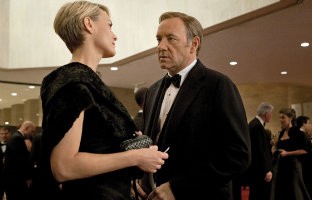Power couple

As the first program available only through Netflix’s streaming service, House of Cards is an experiment in delivering digital content in a way that maximizes profit. Netflix released the entire season at once on February 1. House of Cards is political theater centered on congressman and House majority whip Frank Underwood and his wife Claire (played by Kevin Spacey and Robin Wright). The show is based on a novel by Michael Dobbs and adapted for the American audience from a British drama.
Claire alone calls Frank “Francis.” I doubt that the American adapters of the series changed the wife’s name from Elizabeth to Claire to provide an allusion to another saint of Assisi, but after the flurry of comment on the pope’s choice of the name Francis—a signal of solidarity with the poor and the vulnerable—both names resonated with me.
Read our latest issue or browse back issues.
If the witness of Francis and Clare was possible only in a world full of the grace of God, the story of Frank and Claire Underwood is plausible only in a world stripped bare of that grace. The plotting is blunt about this: Frank’s devotion to power at any cost is the devotion of a man bereft of God. Frank and Claire’s story is one of grasping for power, a story of corruption, conspiracy and coldness.
The show is marbled with moments of direct address from Frank to the audience, a Shakespearean device that does a lot of work. When Frank looks straight at the camera, his asides become an avenue for the terrible and honest words that he rarely speaks to his wife, his colleagues or the public. The device draws the viewer in; we almost become Frank as he includes us in the truth about himself. “Power is a lot like real estate,” he says, “It’s all about location, location, location. The closer you are to the source, the higher your property value.”
His plot to draw near that power makes for can’t-look-away viewing, and Wright and Spacey give remarkable performances. They portray a marriage built on an agreement that power is everything. It is a marriage that refuses to play by traditional rules and, in that refusal, works chillingly well in a way that makes it all the more interesting when that agreement begins to show signs of cracking. Frank and Claire’s extreme competence makes them great at what they do, and in the Underwoods’ house of cards, everything—sex, money, marriage, career, people—is an exercise of power. In the politics of the show, religion is power too.
We feel God’s absence all the more in two significant church scenes. Near the beginning of the season, Frank is shown in his hometown church masterfully using Christianity as a tool. He is a perfect mimic of the cadences of faith, and he uses it to get what he wants. In the season’s last episode, a brilliant shot moves us from Frank set against a towering cathedral—most of the screen filled with the vertical space of the building—to Frank before the altar, the camera looking down on him.
Frank lifts his face to heaven and meets the viewer’s eyes for one of his familiar direct addresses, this time to a god whose place we occupy: “Every time I’ve spoken to you, you’ve never spoken back. Although, given our mutual disdain, I can’t blame you for the silent treatment.” Frank’s face fills the whole shot as he looks straight at us: “Perhaps I am speaking to the wrong audience.” The camera shifts, and Frank looks down, shifting his address to an imaginary Satan: “Can you hear me? Are you even capable of language if you only understand depravity?” A door opens, and we see the tiniest weakness in Frank’s armor as he wonders whether the worst of his own depravity is coming to meet him. But the moment of vulnerability is gone in an instant: it’s just a janitor, opening a door—beneath Frank’s notice.
Francis of Assisi would not have dismissed the janitor, but Frank Underwood never thinks of doing otherwise. He kneels, and now he is looking down on us: “There is no solace above or below. Only us. Small. Solitary. Striving. Battling one another. I pray to myself, for myself.” House of Cards is great television and a chilling portrayal of a world without God.






